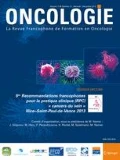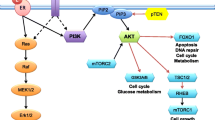Abstract
The advances in biologic analyses based on gene expression profiling have allowed the classification breast cancers into four different diseases. Also, molecular analyses have allowed the identification of a number of candidate therapeutic targets. Such identification requires, now, the evaluation of each targeted agent in biologically-selected populations. Such changes in the model of drug development induce a number of implications. First, targeted agents will have to be developed for rare molecular diseases. Second, such model of development will require the launch of bioassay for each molecular alteration. In this review, we will first present the most frequent “targetable” genomic alterations observed in breast cancers. Then, we will discuss the implications in terms of development of targeted agents.
Résumé
Les progrès des analyses biologiques ont permis de sous classer les cancers du sein en différentes entités moléculaires, et d’identifier un panel de cibles thérapeutiques candidates. L’identification de ces cibles impose, dorénavant, d’évaluer chaque médicament dans des populations définies par les analyses moléculaires. Ce changement dans le développement des médicaments pose un certain nombre de problèmes. Tout d’abord, il impose, dorénavant, de tester les médicaments dans des maladies moléculaires rares. Ensuite, il nécessite la mise au point de tests moléculaires, dont le nombre élevé pourrait à terme être un frein. Enfin, il pose le problème de l’organisation des soins autour des analyses moléculaires. Dans cette revue, nous décrirons dans un premier temps les différentes cibles thérapeutiques candidates observées dans le cancer du sein, puis nous discuterons les implications du développement de la médecine personnalisée par les analyses moléculaires.
Similar content being viewed by others
Références
André F, Campone M, Hurvitz SM, et al. (2008) Multicenter phase I clinical trial of daily and weekly RAD001 in combination with weekly paclitaxel and trastuzumab in patients with HER2-overexpressing metastatic breast cancer with prior resistance to trastuzumab. ASCO Annu Meet (abstract no 1003)
Andre F, Job B, Dessen P, et al. (2009) Molecular characterization of breast cancer with high-resolution oligonucleotide comparative genomic hybridization array. Clin Cancer Res 15: 441–451
Andre F, Nahta R, Conforti R, et al. (2008) Expression patterns and predictive value of phosphorylated AKT in early-stage breast cancer. Ann Oncol 19: 315–320
Baselga J, Semiglazov V, van Dam P, et al. (2009) Phase II randomised study of neoadjuvant everolimus plus letrozole compared with placebo plus letrozole in patients with estrogen receptor-positive breast cancer. J Clin Oncol 27: 2630–2637
Ellard SL, Clemons M, Gelmon KA, et al. (2009) Randomised phase II study comparing two schedules of everolimus in patients with recurrent/metastatic breast cancer: NCIC Clinical Trials Group IND.163. J Clin Oncol 27: 4536–4541
Fong PC, Boss DS, Yap TA, et al. (2009) Inhibition of poly(ADP-ribose) polymerase in tumors from BRCA mutation carriers. N Engl J Med 361: 123–134
Gong Y, Yan K, Lin F, et al. (2007) Determination of estrogen-receptor status and ERBB2 status of breast carcinoma: a gene-expression profiling study. Lancet Oncol 8: 203–211
Kurian AW (2010) BRCA1 and BRCA2 mutations across race and ethnicity: distribution and clinical implications. Curr Opin Obstet Gynecol 22: 72–78
Marty B, Maire V, Gravier E, et al. (2008) Frequent PTEN genomic alterations and activated phosphatidylinositol 3-kinase pathway in basal-like breast cancer cells. Breast Cancer Res 10: R101
Olaussen KA, Commo F, Tailler M, et al. (2009) Synergistic proapoptotic effects of the two tyrosine-kinase inhibitors pazopanib and lapatinib on multiple carcinoma cell lines. Oncogene 28: 4249–4260
O’Reilly KE, Rojo F, She QB, et al. (2006) mTOR inhibition induces upstream receptor tyrosine-kinase signaling and activates AKT. Cancer Res 66: 1500–1508
Shiang CY, Qi Y, Wang B, et al. (2009) Amplification of fibroblast growth factor receptor-1 in breast cancer and the effects of brivanib alaninate. Breast Cancer Res Treat [Epub ahead of print]
Sotiriou C, Neo SY, McShane LM, et al. (2003) Breast cancer classification and prognosis based on gene expression profiles from a population-based study. Proc Natl Acad Sci USA 100: 10393–10398
Stemke-Hale K, Gonzalez-Angulo AM, Lluch A, et al. (2008) An integrative genomic and proteomic analysis of PIK3CA, PTEN and AKT mutations in breast cancer. Cancer Res 68: 6084–6091
Turner N, Lambros MB, Horlings HM, et al. (2010) Integrative molecular profiling of triple negative breast cancers identifies amplicon drivers and potential therapeutic targets. Oncogene [Epub ahead of print]
Tutt A, Robson M, Garber JE, et al. (2009) Breakthrough. Phase II trial of the oral PARP inhibitor olaparib in BRCAdeficient advanced breast cancer. ASCO Annu Meet (abstract: CRA501)
Vogel CL, Cobleigh MA, Tripathy D, et al. (2002) Efficacy and safety of trastuzumab as a single agent in first-line treatment of HER2-overexpressing metastatic breast cancer. J Clin Oncol 20: 719–726
Author information
Authors and Affiliations
Corresponding author
Additional information
Tirés à part: F. André.
About this article
Cite this article
Berrada, N., André, F. Traitements médicaux guidés par la biologie en pathologie mammaire. Oncologie 12, 274–277 (2010). https://doi.org/10.1007/s10269-010-1880-4
Received:
Accepted:
Published:
Issue Date:
DOI: https://doi.org/10.1007/s10269-010-1880-4




